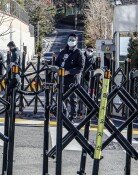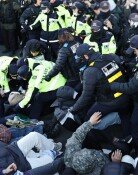Ruling and opposition parties compete to give away 100 trillion won
Ruling and opposition parties compete to give away 100 trillion won
Posted December. 09, 2021 07:32,
Updated December. 09, 2021 07:32
Presidential candidate of the ruling Democratic Party of Korea Lee Jae-myung said on Tuesday that formulating a revised supplementary budget before the presidential election will be considered to expand compensation for small business owners’ damage. He brought up a revised supplementary budget just four days after the biggest annual budget for next year was passed. Some members of the main opposition People Power Party are voicing an opinion to double its presidential candidate Yoon Seok-youl’s pledge of providing 50 trillion won to support small business owners within 100 days of his inauguration. The competition of giving away between the ruling and opposition parties with people’s taxes is getting worse.
“The government has spent a tiny amount to support small business owners. It has not fulfilled its responsibility,” said Lee. “It was his political message to discuss a reviewed supplementary budget,” said Park Wan-joo, the head of the party’s policy committee. “Yoon pledged 50 trillion won but it won’t be enough,” Kim Chong-in, the general chair of the People Power Party’s election campaign committee, said on the same day. “If he takes office, a budget of 100 trillion won should be reviewed.” Kim proposed reducing each government ministry’s budget by five to 10 percent and issuing government bonds, if not enough.
One hundred trillion won is about 16.5 percent of next year’s budget, which needs every South Korean, including newborns, to pay 1.94 million won in tax to make up for. Yet, politicians don’t think it is just a small change. The Moon Jae-in administration overspent its budget, which increased the national debt to GDP ratio from 36 percent during his first year in office to 50 percent next year. Adding 100 trillion won in debt, the ratio will rise to 54.7 percent.
International credit scoring companies that decide national credit ratings are paying close attention to South Korea’s sharply increasing debt. The fact that the South Korean national bonds’ interest rate rose to a three-year high right after Lee mentioned providing COVID-19 financial support to all people at the end of October is circumstantial evidence. A rise in national bonds’ interest rate will put pressure to increase the base rate, which means an increase in debt burden for individuals and corporations.
The ruling and opposition parties are raising their levels of giving away as if a national policy is a poker game. As the two parties, one of which will produce the next president, compete to give away more money, the next administration’s likelihood of an economic crisis from the worsening financial situation is growing. If more support will be given to small business owners, the parties should clarify which budget items will be reduced to come up with the necessary budget. Claims that national debt is not all bad or that government bonds should be issues without such efforts are deceptive to young people who will have to carry the burden of the debt and pay it with taxes.







